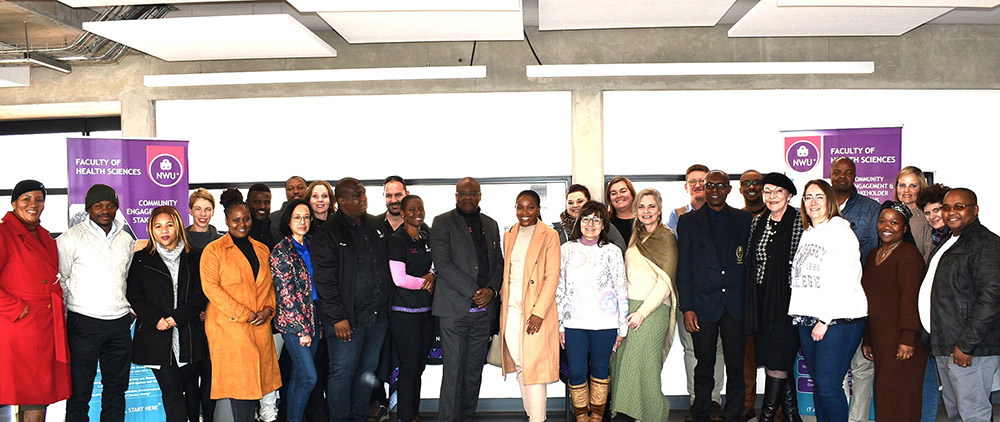The Faculty of Health Sciences at North-West University (NWU) recently hosted an Engaged Scholarship Impact Indaba at the Vanderbijlpark Campus.
The dynamic one-day hybrid-event brought together community champions - including academics, community leaders, practitioners and students - to explore the potential of engaged scholarship.
Participants from various sectors shared their experiences and insights, making the Indaba an ideal platform for knowledge exchange and dialogue.
The event highlighted the critical intersections of academic research, community engagement and societal impact, showcasing how collaborative efforts can drive meaningful change. Furthermore, it offered diverse perspectives on how academic institutions can partner with communities to address pressing social issues.
“By embracing a culture of community engagement, we not only enrich our academic experiences, but also fulfil our institutional mandate to serve as agents of positive change and social responsibility,” said Prof Awie Kotze, executive dean of the Faculty of Health Sciences, in his opening remarks.
“Let us embark on this journey of discovery, reflection and action together, inspired by the belief that our collective efforts can truly make a difference in the world.”
Prof Jeffrey Mphahlele, deputy vice-chancellor for research and innovation, delivered the keynote address titled “Researching for relevance and impact: NWU position.”
He emphasised the importance of supporting and collaborating with communities for mutual benefit. “Mutual benefit is the most crucial aspect. It encompasses the co-creation of knowledge and various other advantages that both the university and the community can gain. However, it goes beyond that because true engaged scholarship is not a one-way street. If the community does not take ownership of the initiatives, it becomes merely an act of giving back rather than a mutually beneficial collaboration.”
He stressed that for a genuine partnership, both the community and the researchers must take ownership of the projects.
Dr Eugene Machimana, head of Curricular Community Engagement at the University of Pretoria, delivered an insightful presentation titled "Impacting communities through curriculum dynamics: A cyclical relationship”.
He highlighted the importance of integrating community engagement into academic curricula, fostering a reciprocal relationship where both students and communities benefit from shared learning experiences.
Dr Petro Erasmus, a senior lecturer in psychology, and a community engagement champion at the NWU, shared her personal experiences in a presentation titled "Commercialising research outcomes and engaged scholarship”.
She discussed how engaged scholarship can bridge the gap between academic research and real-world applications, highlighting successful initiatives that have transformed research outcomes into practical solutions for community challenges. Her presentation underscored the potential for universities to act as catalysts for social innovation by leveraging their research capabilities.
Chevaan Reedwaan Peters, manager of Knowledge Information Systems and Marketing at Stellenbosch University, presented on "Effective information systems in ensuring sustainability, and evaluating the impact of engaged scholarship in a resource-limited ecosystem”.
He spoke on the importance of robust information systems in tracking and evaluating the long-term impact of community engagement initiatives. He outlined strategies for ensuring that engaged scholarship remains sustainable, even in environments with limited resources, and highlighted the role of data-driven decision-making to optimise social impact.
The event also featured an international perspective with Alejandra Herrero from the CLAYSS Latin American Centre for Service-Learning in Argentina. Her presentation, "Impacting communities through engaged scholarships and international networks: Experience of the Global South", provided valuable insights into how global networks can enhance the effectiveness of engaged scholarship.
Alejandra shared stories of successful partnerships across the Global South, demonstrating how international collaboration can drive positive change and foster cross-cultural understanding.
Prof Julie E Gahimer from the University of Indianapolis delivered a thought-provoking session titled "Enhancing the 21st century skills: An e-service learning toolkit of creative pedagogies”. She introduced innovative pedagogical tools designed to enhance students’ 21st century skills through e-service learning., including critical thinking, collaboration and digital literacy Her presentation highlighted the potential for creative educational approaches to empower students and prepare them for the complexities of the modern world.
Sizwe Khoza, a professional officer for engaged research at the National Research Foundation (NRF), facilitated a session on "Advancing societal and knowledge impact through the NRF’s Engaged Research Framework”. He discussed the NRF's mission to promote science and technology advancement in South Africa through its science engagement business unit, the South African Agency for Science and Technology Advancement.
He emphasised the importance of bridging the gap between academic research and societal needs, highlighting how the NRF's Engaged Research Framework supports initiatives that foster collaboration between researchers and communities.
Finally, Prof Ushotanefe Useh, deputy dean for community engagement and stakeholder relations in the Faculty of Health Sciences, expressed his profound gratitude and appreciation to all participants on behalf of the faculty.
The Indaba exemplified the power of collaboration and shared learning in addressing societal challenges. By fostering dialogue and partnerships between academia and communities, the event underscored the potential for engaged scholarship to drive sustainable change and improve the quality of life for communities across the globe.

The Faculty of Health Sciences’ Engaged Scholarship Impact Indaba was a great success.

Prof Jeffrey Mphahlele, the deputy vice-chancellor for research and innovation, participates virtually in the Indaba.

Prof Ushotanefe Useh, the deputy dean for community engagement and stakeholder relations in the Faculty of Health Sciences, thanks all the participants.
